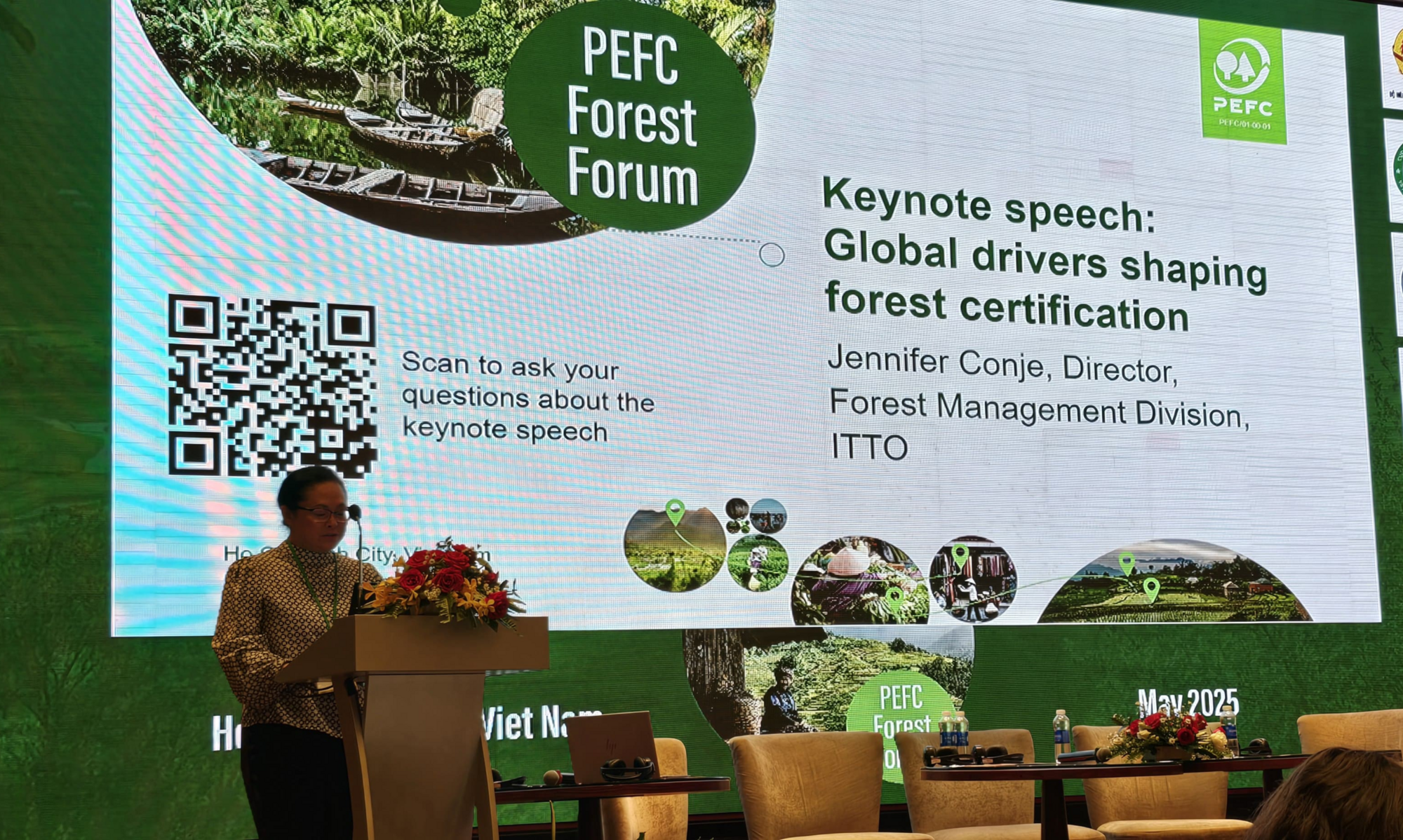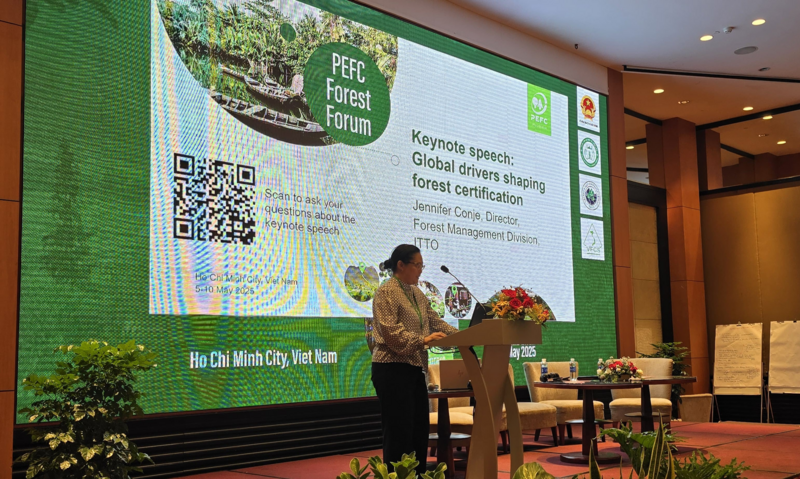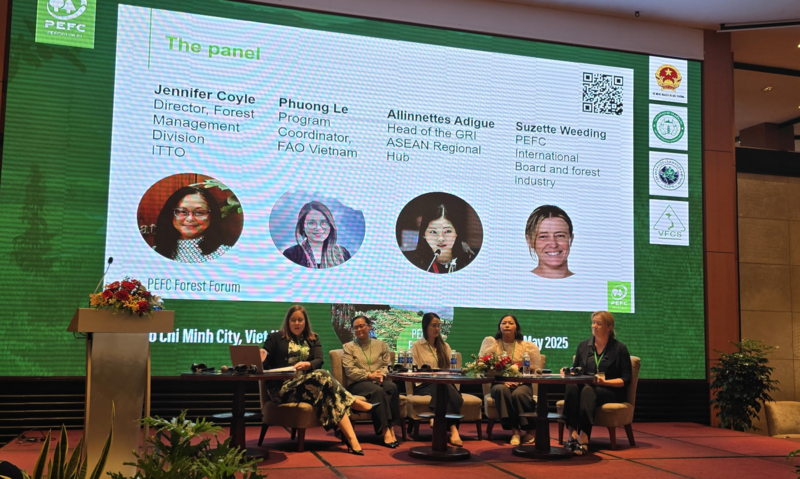Charting the future of forest certification: ITTO leads dialogue at the PEFC Forest Forum
08 May 2025, Ho Chi Minh City

ITTO Director of Forest Management Jennifer Conje speaks at the PEFC Forest Forum 2025 in Ho Chi Minh, Viet Nam. Photo: Tetra Yanuariadi/ITTO
The International Tropical Timber Organization (ITTO) took center stage at this year’s PEFC Forest Forum in Viet Nam, where Director of Forest Management Jennifer Conje delivered the keynote address and joined a panel discussion on the future of sustainable forestry. Held under the theme "Navigating Global Trade: How PEFC certification strengthens forests and business resilience,” the forum convened diverse stakeholders from across the forest sector to explore how evolving global frameworks are reshaping certification systems, international trade, and the long-term sustainability of forests.
Uncertainty: The kryptonite of business and trade
In her keynote speech, Conje explored the sweeping geopolitical, environmental, and market forces redefining forest certification and forest-based businesses. From climate agreements and biodiversity frameworks to trade shocks and corporate sustainability requirements, she laid out how certification systems, like PEFC, can serve as critical tools for businesses and governments alike. “As kryptonite is to Superman, uncertainty is to the business and trade environment. Some level of assurance and certainty is necessary for businesses (to operate)”, said Conje.“Assurance is essentially why certification systems like PEFC exist. The markets want assurance—in this case, of sustainability and legality”, she added.
Conje urged participants to see the current complex landscape as a challenge and an opportunity for innovation, investment, and resilience. She emphasized that businesses must increasingly anticipate regulatory shifts and consumer expectations by adopting diversified, transparent, and sustainable sourcing practices.

In her address, Conje emphasized that the EU Deforestation Regulation (EUDR), Corporate Sustainability Reporting Directive (CSRD), and evolving biodiversity and climate requirements are part of a bigger movement—one that demands traceability, accountability, and above all, integrity in how we manage and source from our forests.
Highlighting ITTO’s role in supporting legal and sustainable tropical timber trade, she reiterated the Organization’s long-standing support for independent third-party certification, while challenging the sector to reflect on how market and policy pressures impact certification standards.
“At what point does a certification standard wholly become defined by market demands,” she asked, “versus remaining rooted in science, local context, and the principles of sustainable forest management?” Conje asked the audience.
An all-female panel on forest policy futures
Conje also joined an inspiring all-female panel discussion titled "Navigating the Evolving Policy Landscape: Risks, Rewards, and Responses," alongside speakers from the UN Food and Agriculture Organization (FAO), the Global Reporting Initiative (GRI), and the PEFC International Board. The session explored how global frameworks like the Paris Agreement, the Kunming-Montreal Global Biodiversity Framework, and emerging ESG disclosure standards influence corporate strategies, forest policies, and rural livelihoods.
The panel examined how PEFC and similar standards adapt to meet growing climate action, biodiversity conservation, and social inclusion expectations. Panelists discussed the balancing act companies must perform to remain competitive and compliant while contributing positively to communities and ecosystems.

The future of forests
As forest-based industries brace for increasing scrutiny and complexity, from carbon markets to CITES listings, ITTO’s participation in the event reaffirmed its commitment to helping member countries and stakeholders navigate these changes.
ITTO’s recent work in strengthening CITES implementation, updating biodiversity guidelines, and promoting sustainable forest landscapes as part of global climate and restoration agendas are examples of these proactive engagements to support its membership.
“Whether it’s biodiversity, climate, or sustainable livelihoods, third-party certification is more relevant than ever in some markets, to ensure market access and fair and just trade,” ITTO Executive Director Sheam Satkuru remarked. “We must continue to address the hard questions and formulate credible, implementable and cost-efficient solutions by refining our tools and enhancing engagement with all stakeholders so they serve both people and the planet”, she added.
For ITTO, the PEFC Forest Forum was more than a dialogue; it reflects the ITTO’s good working relationship with the PEFC and this dialogue is a repeated call to action to ensure tropical forests remain at the core of a sustainable global economy and to be unified in dealing with the kryptonites of global timber trade.